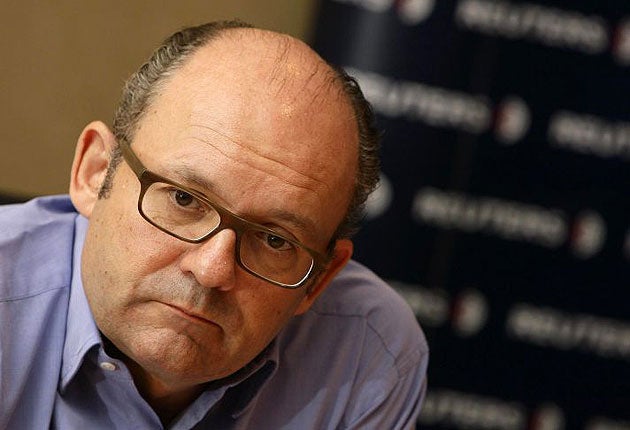Tullett Prebon’s boss avoided those big numbers - for a very good reason
Outlook

Your support helps us to tell the story
From reproductive rights to climate change to Big Tech, The Independent is on the ground when the story is developing. Whether it's investigating the financials of Elon Musk's pro-Trump PAC or producing our latest documentary, 'The A Word', which shines a light on the American women fighting for reproductive rights, we know how important it is to parse out the facts from the messaging.
At such a critical moment in US history, we need reporters on the ground. Your donation allows us to keep sending journalists to speak to both sides of the story.
The Independent is trusted by Americans across the entire political spectrum. And unlike many other quality news outlets, we choose not to lock Americans out of our reporting and analysis with paywalls. We believe quality journalism should be available to everyone, paid for by those who can afford it.
Your support makes all the difference.Just about everyone seems to like broker Tullett Prebon getting into bed with Icap, a company which used to be its bitter enemy. So why did Tullett’s shares take such a battering when a deal to buy Icap’s voice broking business that everyone knew to be in the offing (thanks to the efforts of one of my colleagues) was announced?
“Technical reasons,” Tullett’s chief executive John Phizackerley, whose appointment last year was the catalyst that allowed the deal to be done, said airily during a call with reporters.
There’s something in that. Tullett is issuing nearly 310 million new shares that will be paid over to Icap and its shareholders to fund the deal. Tullett only had 243.3 million shares in issue prior to its announcement, so a certain amount of price volatility was only to be expected.
However, it’s also true that the cost savings Mr Phizackerley announced in the wake of the transaction were underwhelming, to say the least. Some £60m of savings from a business with a combined revenue of around £1.5bn was the quoted figure “arising from the elimination of duplicated management and support costs”.
The problem facing Mr Phizackerley is that voice broking is heavily reliant on people, who use their very particular skills to broker deals between banks across a bewildering array of financial instruments.
Michael Spencer, the founder of Icap, once said it was like having a fleet of tankers which require regular maintenance, refuelling and lots of TLC. The electronic businesses his Icap will keep were, he said, more like a pipeline. Once it’s up and running it’s very cheap to push things through it.
Mr Phizackerley will doubtless extract very much more than the £60m he’s quoting. Expect his 5,500 strong headcount to be rather lower this time next year. But he can’t afford to frighten his brokers with the sort of scary numbers some of the analysts are talking about – their estimates of the potential savings have gone as far as £300m.
If Mr Phizackerley were to quote a figure like that, half of them would be calling up their old mates from one of his rivals to inquire about the possibility of new employment. That’s if the rivals don’t make the first move. The reason he needs Icap’s US business is that BGC nabbed all his brokers there and while a court settlement was ultimately reached, the damage was done.
In the meantime Mr Spencer is sitting pretty. His company has 19 per cent of the newly enlarged Tullett, with the rest of the shares having been handed to his investors.
So he gets a piece of the upside if it works. He’s also relieved of having to hold a huge slug of capital that the regulators demanded he keep when he owned a voice broker and thus has lots of cash to invest in his high margin technology business. It rather looks as though Mr Spencer will be able to relax with a bottle of his beloved claret while Mr Phizackerley is hunting his next caffeine fix.
Join our commenting forum
Join thought-provoking conversations, follow other Independent readers and see their replies
Comments